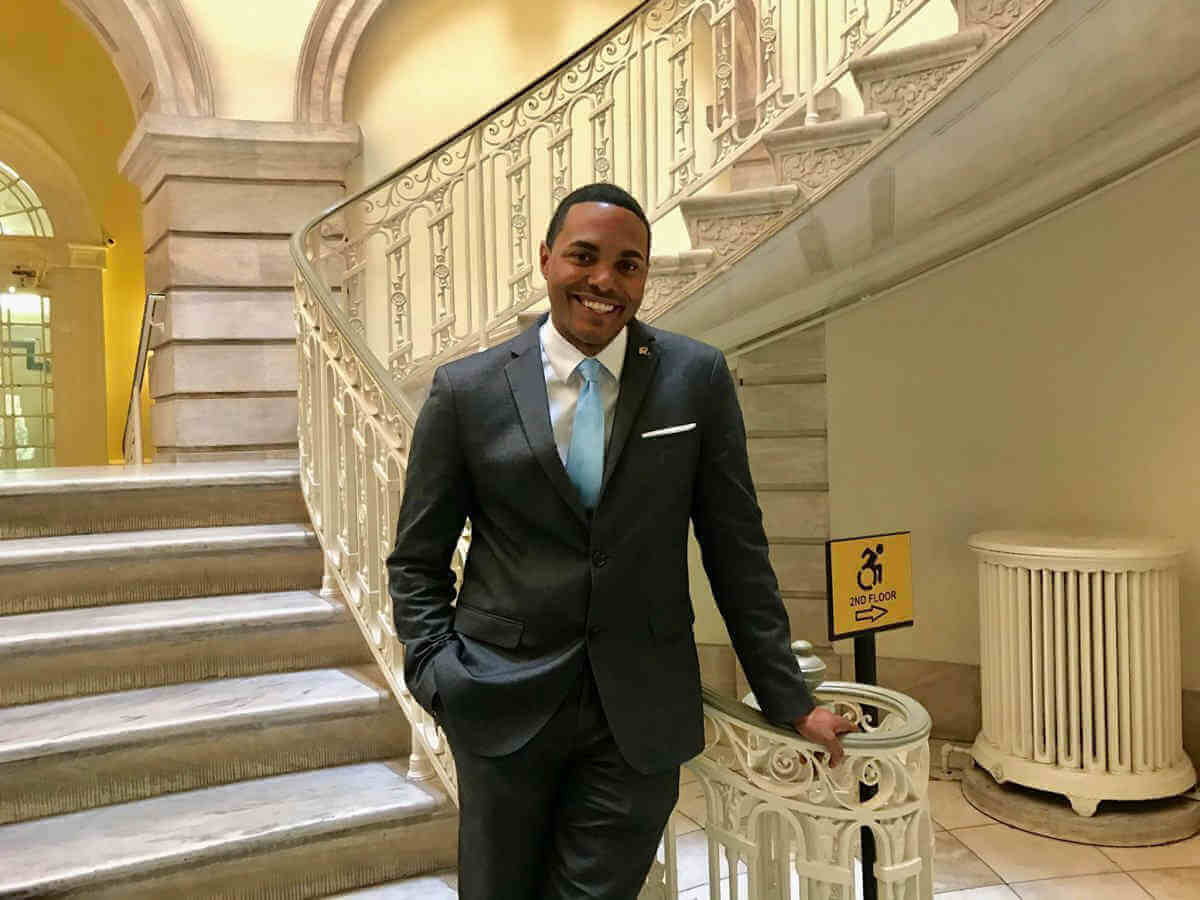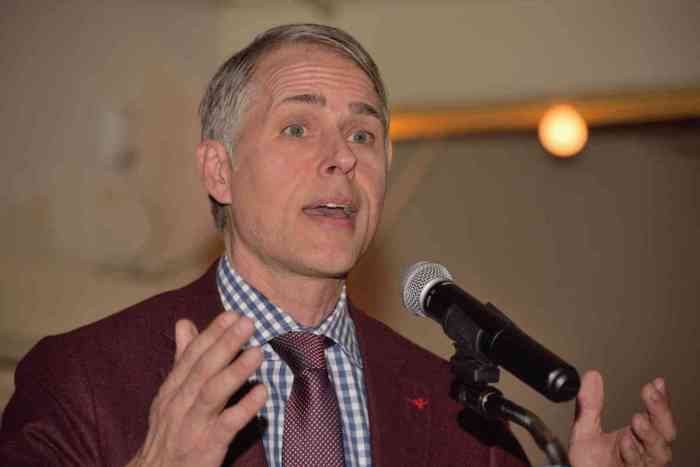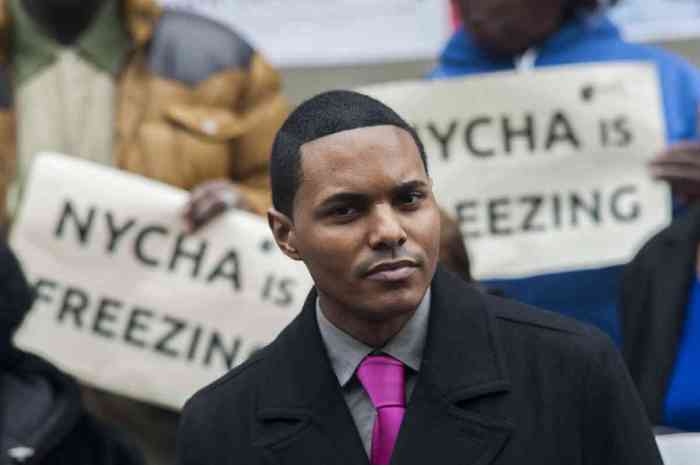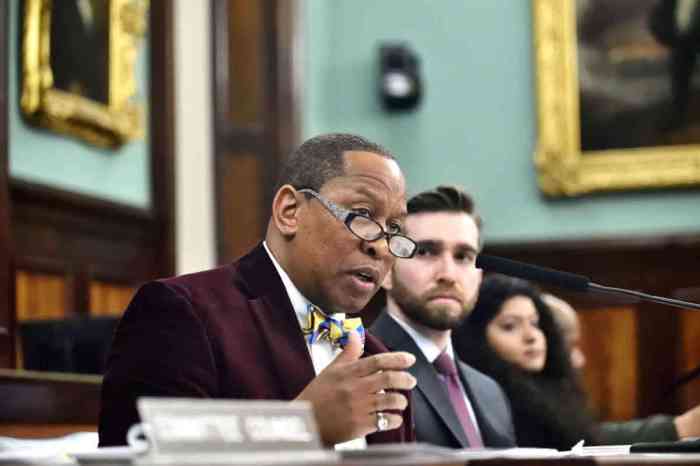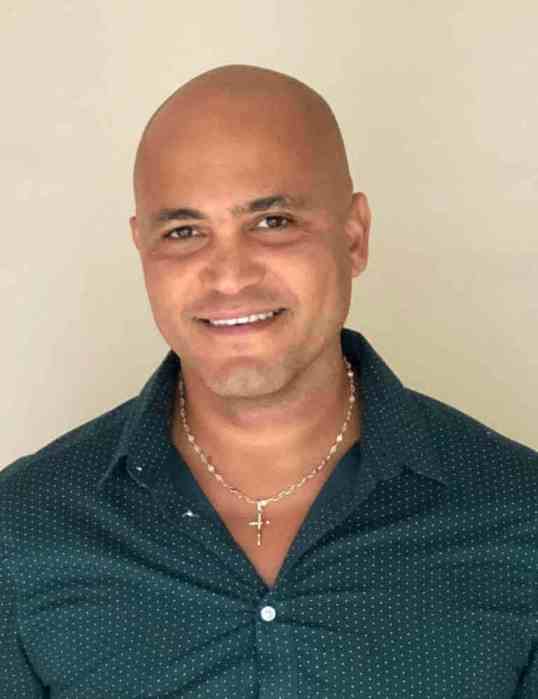Out gay Bronx City Councilmember Ritchie Torres carries himself with confidence these days because, after all, he has “enjoyed overcoming the odds.”
A product of the borough who grew up in public housing, endured fierce battles with depression, and was once told he had no business running for office, Torres indeed overcame the odds in 2013 when he became the first openly gay person elected to office in a borough that he says is “widely seen as the most conservative one.”
Now the councilmember — who has since developed into a powerful political force in New York City — could take that a step further by becoming the first openly LGBTQ black or Latinx person to be elected to Congress and the lone LGBTQ member of the New York City congressional delegation if he emerges victorious in the 2020 contest to replace outgoing Represenatative José Serrano in the 15th district.
“It’s an historic race,” Torres said during a May 7 interview with Gay City News. ”I’m black, I’m Latino, I’m LGBT. I’m a millennial. I’m a child of the Bronx. My values and beliefs are shaped by who I am and where I come from. It’s true of most people but it’s true of me especially.”
Although Torres, 31, has yet to formally declare his candidacy, he said multiple times during this interview that he is “running for Congress.” He outlined his priorities moving forward, reflected on his work in the City Council, and opened up about the looming congressional race that is already shaping up to consist of a crowded Democratic primary field. Assemblymember Michael Blake and homophobic Councilmember Ruben Diaz, Sr., have both announced bids for the seat, while Bronx State Senator Gustavo Rivera, among others, has admitted interest.
But just how Democratic some of those candidates are is an important distinction. Diaz, who announced his run not long after he sparked outrage when he spouted homophobic nonsense about LGBTQ people and out gay City Council Speaker Corey Johnson, brands himself as a “conservative Democrat.”
Torres doesn’t see the 76-year-old Diaz as a Democrat at all.
“No one is more hostile to LGBT equality than Councilmember Ruben Diaz, Sr.,” he asserted. “The councilmember has a right to hold whatever beliefs he wants, but he is running in the wrong primary. He should be running in the Republican primary. The question is: Do the voters in the South Bronx want to support a Republican to be the representative of the most Democratic district in America? That is an experiment.”
With Diaz’s presence in the race, Torres painted a picture of a field of contenders who reflect several fault lines in the district, from ideological and cultural differences to a generation gap.
“[Diaz] is a creature of the right, I am a creature of the pragmatic progressive left,” said Torres, who is more than four decades younger than Diaz. “He’s a leading voice of opposition to LGBT equality, I am an LGBT trailblazer in the Bronx. So the race is about the future of the Bronx. Who we elect as our congressperson in the 15th district will speak powerfully about the values of the borough. It is by far the most consequential race in the Bronx in decades.”
Torres has injected himself into the mix for an office that he considers to be a “natural progression” from his role in the City Council because it would allow him to wield more power on a number of fronts, but most notably his signature area: housing. Citing statistics about the hundreds of thousands of people on public housing waiting lists and the backlog of folks languishing in homeless shelters, Torres emphasized the need for a stronger push toward eradicating the city’s affordability crisis.
“I’ve come to recognize that the policies in housing and health care are largely set at the federal level,” Torres said. “If you’re a progressive problem solver who is on a mission to fight poverty in New York City, the impact can only be at the federal level. That’s why I’m running for Congress.”
During his first bid for City Council in 2013, Torres was a newcomer in every sense of the word — from the idea of governing to living as an out gay man. He managed to dispatch a handful of other contenders in that year’s Democratic primary before cruising to victory in the general election, but it didn’t come without turbulence. He witnessed instances of homophobia from other politicians along the way.
“I’ll be honest. It was unnerving,” Torres said. “It was terrifying for me as an openly LGBT 24-year-old to run for public office and to run so visibly and openly.”
Fast forward to 2019 and much has changed, even as multiple anti-LGBTQ politicians still lurk in the Bronx and elsewhere in the five boroughs. Torres, now in his second term, feels much more secure with his life. The notion of running a campaign as an out gay person isn’t as daunting as it was before.
That’s not to say the status quo is sufficient — and Torres is well aware of that. He said one of his “highest priorities” as a congressmember would be to work on the Equality Act, which would amend the 1964 Civil Rights Act and related federal laws to ban discrimination on the basis of sexual orientation and gender identity. That bill is expected to pass the Democratic-controlled House of Representatives within days but almost certainly will die in the GOP-led Senate.
The Bronx councilmember’s body of work on queer issues speaks for itself. He currently has a bill pending in the City Council that would certify LGBTQ-owned small businesses similarly to the way the city incentivizes funding for minority and women-owned businesses. He also led efforts to secure millions of dollars to establish LGBTQ senior centers in every borough, passed a law that allows LGBTQ shelters to serve youth up to the age of 24 years old and, among other initiatives, established the first Department of Homeless Services shelter for queer young people up to the age of 30 known as Marsha’s House, which is in his borough.
“It was the first time an elected official asked for a shelter to be brought to his district,” Torres claimed. “That was unusual, but it was the right thing to do and I was the right person to do it.”
He is also keeping tabs on of the LGBTQ community’s most affected demographics: transgender women of color. He blasted the city’s Department of Correction after the agency voiced its opposition to a task force dedicated to transgender women in city custody, a move that Torres said was “unacceptable” and “demonstrates that there continues to be prejudice against trans people — not only among everyday people but policymakers.” He also recently signaled a willingness to embrace the plight of sex workers when he signed onto a letter demanding an investigation into the NYPD’s Vice Squad amid allegations that police have been mistreating sex workers.
The councilmember waded into the waters of the debate on the decriminalization of sex work, saying he is “supportive and I see the advocating on behalf of sex workers as a part of a larger shift towards decriminalization and decarceration.”
Issues that aren’t directly viewed as LGBTQ issues affect the queer community, as well. Torres is calling on the city to pour more money into “bridge” programs that help educate workers, an issue that ties into his wider belief that the disappearance of jobs represents the greatest challenge facing our society beyond climate change. That, he said, is in and of itself an LGBTQ issue, because “whatever affects the general population will affect LGBT people of color even more and trans people of color to an even greater extent. When one group sneezes, the other group gets the flu.”
Torres’ track record of success on LGBTQ causes underscores the significance of diverse representation in politics, but it is also important in light of the lingering presence of homophobes like Brooklyn Councilmember Chaim Deutsch, Bronx Councilmember Fernando Cabrera, and Diaz. Torres conceded that he is a “pragmatist” and must work with lawmakers like them to advance issues important to his constituents and vulnerable communities across the city.
“We should be open-minded and inclusive but not so open-minded that our brains fall out, and not so inclusive that we lose our identity,” he said.
Having to work with lawmakers in Washington would be an entirely new endeavor, of course. Torres is stepping up his criticism of Donald Trump as he eyes an office that would put a check on the president, who has cozied up to religious conservatives by advancing multiple rules that give health care providers a right to discriminate against LGBTQ people.
“It’s hard to imagine a more sinful president than Donald Trump — that he’s become the champion of the religious right,” Torres said.
Whether Torres would be dealing with Trump if he is elected to Congress remains to be seen. In the meantime, he is “impressed” with the slate of presidential candidates he has seen on the Democratic side and is inspired by the out gay mayor of South Bend, Indiana, Pete Buttigieg.
“He’s calm, collected, yet compelling,” Torres said. “No matter where his candidacy goes, he should be remembered as a trailblazer.”
Torres, too, was calm and collected during this interview, but clearly driven to shake up the race in the 15th Congressional District — regardless of who his competition might be or the homophobia of an already-declared candidate. He now navigates the political realm as a veteran pol who feels prepared to take a step that once seemed unimaginable.
“Here I am, six years later, the first LGBT elected official in the Bronx, and I’m running for Congress,” Torres said. “So the lesson learned in my life, even in the darkest moments, is to never lose sight.”

